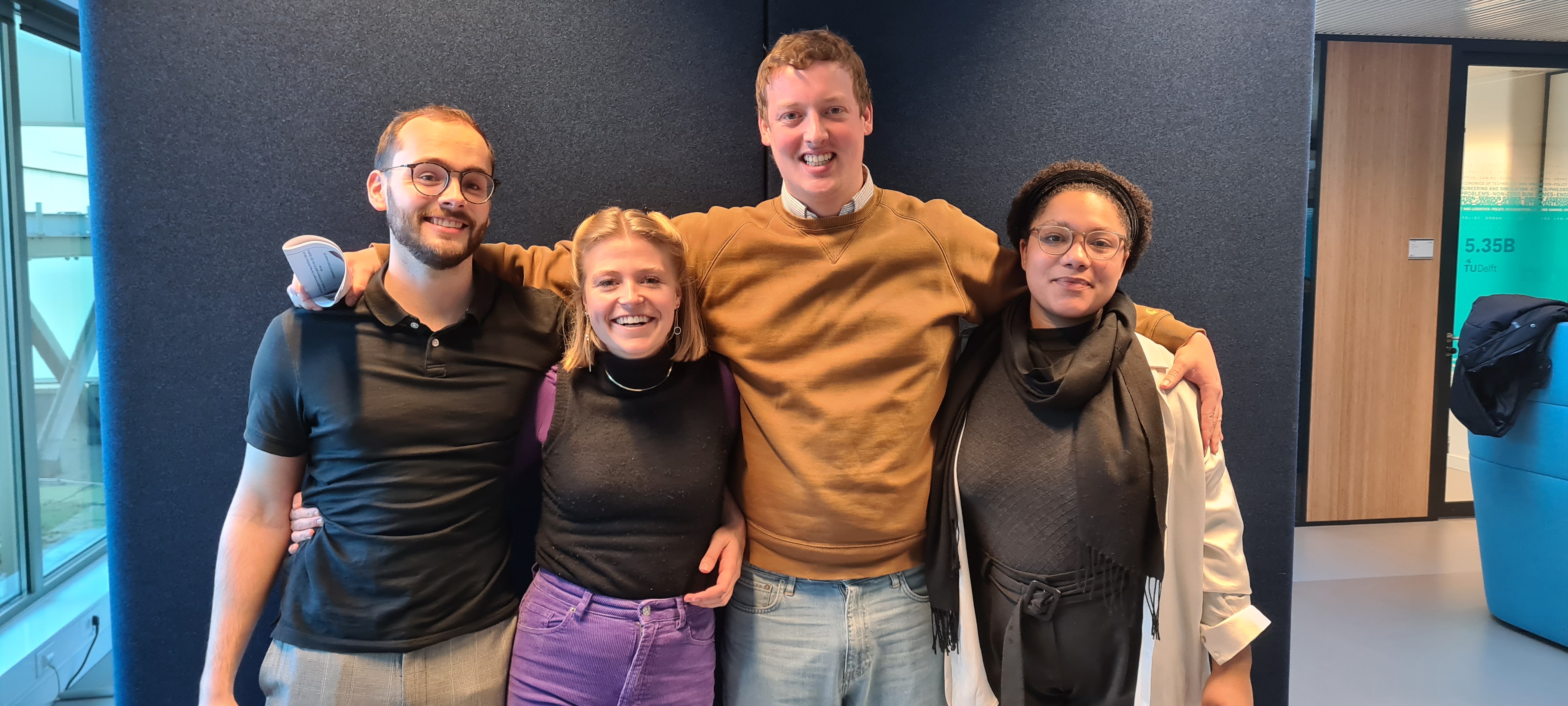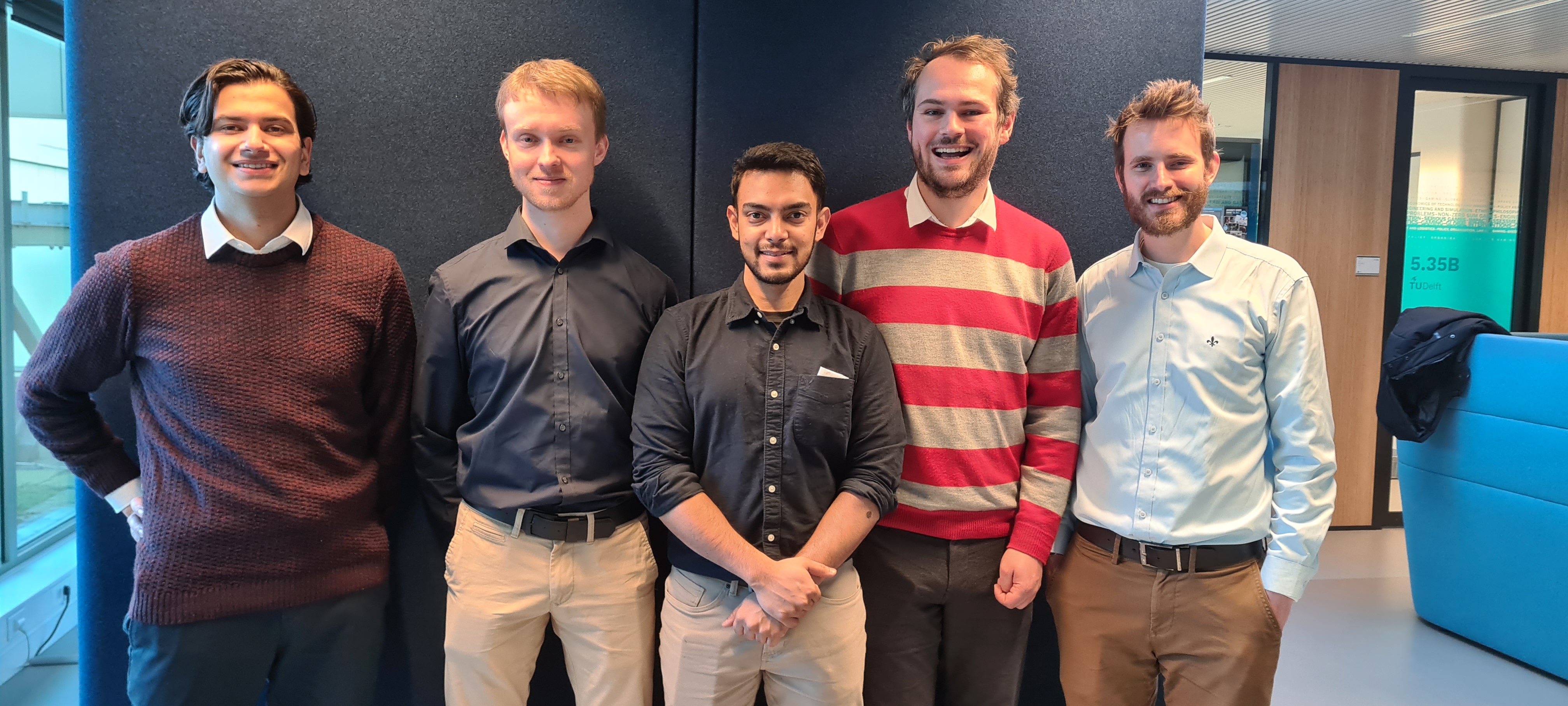Collaboration Neighbourhood Agenda and EPA students
On Tuesday January 17, two groups of EPA students were given the opportunity to present their collaborative projects with the Municipality of The Hague to fellow students and employees of the Municipality of The Hague. This is part of the course “Societal Challenge Project” which EPA students can choose in their second year of study. Anneke Zuiderwijk is module manager of this course.
The “Energy Poverty” team first explained what energy burden meant. This is often expressed as a percentage, determined by the costs that a household spends on energy consumption in relation to the total income of this household. If this percentage is greater than ten, then there is a case of energy poverty. In collaboration with the Municipality of The Hague, the team concluded that the data on energy use in The Hague is often static and difficult to analyse.
It happens to be a major challenge for the municipality to quickly formulate effective policy for different districts, demographic groups or other population groups in The Hague, while the data is actually available. Team “Energy Poverty” has therefore developed a dashboard based on a large number of parameters, known to and supplied by the Municipality of The Hague. This dashboard provides policy makers and other stakeholders insights into how the distribution of energy consumption is in relation to the average income of certain households.
Policy officers can draw conclusions from this in order to offer the various districts effective solutions that specifically apply to them. This collaboration and especially the dashboard enables the municipality to quickly lend a helping hand to people suffering from energy poverty.
The team itself was very enthusiastic about the collaboration and one student said “I enjoy working on a relevant project with stakeholders that are actually involved”. And “the fact that we are working on a project with a real client who takes the time to help us is really appreciated”.
The group, which conducted research into energy poverty, was supervised by Berit Piepgras (Participation Advisor for The Hague Environment Vision 2050, Haags Samenspel). “We experienced the collaboration with the students as a gift. It is an excellent opportunity for the project and team Environmental Vision The Hague to supplement the ongoing research into the future of The Hague 2050. The students discussed the blind spots. The interesting analyses and translations provide new perspectives. This helps us to practice integrated working and connecting the environmental vision (2050) and the objectives from the Neighbourhood Agenda, with a term of four years. We look forward to the final presentation with suggestions for practical solutions!”
Team 2 focused on “Guidelines for a Buddy System”. In the Municipality of The Hague, the percentage of school dropouts between the ages of 10 and 14 is high. This is due to various facets in society in which social divisions play a major role. The division between young people is increasing and has a negative effect on society. How can we increase the social connection between young people and the solidarity between different groups? The main focus here is on different cultural groups, different neighbourhoods and population groups. To ensure more interaction without social conflict, the team developed a framework and guidelines for the municipality to set up different types of Buddy systems.
Here we first looked at the diversity between different young people between the ages of 10 and 14. Subsequently, the team made an analysis of what youth within certain groups do have in common and then developed the buddy system divided into P2P and P2M.
P2P focuses on Peer-to-Peer, where two young people of the same age from different groups are linked and encouraged to undertake activities together. This has an organic flow in which cooperation is monitored and stimulated, but there is no mutual obligation. The goal of this system is to have young people learn from each other and thus reduce the differences and increase the connection.
In the P2M system, the Peer-to-Mentor system, a young adult is trained to mentor a peer, a youth, and teach him/her new things. This is a structural method where peer and mentor meet regularly and there is always progress as long as the mentor does his/her best to expose the peer to other aspects of society.
As the initiator, the Municipality of The Hague is a major influencer of the buddy system and can deploy it in different neighbourhoods or population groups to achieve a positive result and, among other things, reduce school drop-out rates and increase social cohesion.
Team “Buddy System” was very enthusiastic about the cooperation and were happy that “the talks with the municipality were an actual application of their knowledge”. Also “the effort that is put in by the teaching staff and the Municipality of The Hague was very motivating to keep working on the project”.
Mohamed el Khalifi (Project Leader of the Neighbourhood Agenda at the Centrum District) supervised the research of the buddy system. He could read the research proposal from the start and was able to make a number of suggestions. This also gave him insight into how they saw certain issues and wanted to tackle them. What struck him was the awareness that because of their open mind they chose different angles than he expected. “In my opinion, the collaboration was pleasant and relaxing. In the municipal system we are too involved in the matter. As a result, certain angles may be missed. It was a refreshing way for me to see how the students used their creativity to tackle the case.”
Module Manager Anneke Zuiderwijk emphasizes that this collaboration between the Municipality of The Hague and TU Delft is a great opportunity to learn from each other, for the students and the teachers involved as well as for the employees of the municipality. The students worked on complex multi-actor problems in which fundamental EPA themes came together: policy, politics, analytics, modelling and simulation, applied to current and existing cases. The students have adopted a very professional attitude, as was also noted by the municipality.
Marlies Vulto, Program Manager of the Neighbourhood Agendas and Information Driven Working at the municipality, praised the depth of the student projects and the great collaboration, which brought together various aspects that the municipality is currently working on. She indicated that she was already looking forward to the next collaboration in the following academic year. Reinier Beenen, ICT Management Advisor at the Public Services Department, concluded the presentation session with a nice reflection on what the municipality can achieve with the newly acquired insights. He also invited the students to visit the municipality to explain in detail the direct applicability of their projects for the municipality.
All in all a successful session with all parties looking forward to further cooperation. Vulto added enthusiastically: “the great thing about this collaboration is that all the necessary elements come together here. The collaboration last academic year was a great success. That is why this academic year we decided to work together again. This time, questions from the development of the environmental vision are also involved.”.

